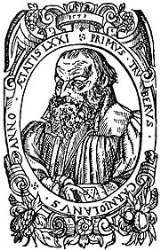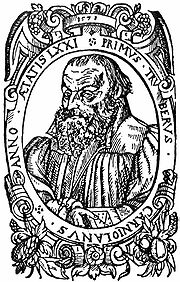
Primož Trubar
Encyclopedia

Protestant Reformation
The Protestant Reformation was a 16th-century split within Western Christianity initiated by Martin Luther, John Calvin and other early Protestants. The efforts of the self-described "reformers", who objected to the doctrines, rituals and ecclesiastical structure of the Roman Catholic Church, led...
, the founder and the first superintendent of the Protestant Church of the Slovene Lands
Slovene Lands
Slovene Lands or Slovenian Lands is the historical denomination for the whole of the Slovene-inhabited territories in Central Europe. It more or less corresponds to modern Slovenia and the adjacent territories in Italy, Austria and Hungary in which autochthonous Slovene minorities live.-...
, a consolidator of the Slovene language and the author of the first Slovene-language printed book. Trubar is a key figure of Slovenian cultural history and in many aspects a major historical personality.
His life and work
Trubar was born in the village RašicaRašica, Velike Lašče
Rašica is a village to the north of Velike Lašče in central Slovenia. The area is part of the traditional region of Lower Carniola and is now included in the Central Slovenia statistical region....
(now in the Velike Lašče
Velike Lašce
Velike Lašče is a town and municipality in Slovenia. It is part of the traditional region of Lower Carniola and is now included in the Central Slovenia statistical region...
municipality) in the Duchy of Carniola
Duchy of Carniola
The Duchy of Carniola was an administrative unit of the Holy Roman Empire and the Habsburg Monarchy from 1364 to 1918. Its capital was Ljubljana...
, then under the Habsburgs. In the years 1520–1521 he attended school in Rijeka
Rijeka
Rijeka is the principal seaport and the third largest city in Croatia . It is located on Kvarner Bay, an inlet of the Adriatic Sea and has a population of 128,735 inhabitants...
, in 1522–1524 he continued his education in Salzburg
Salzburg
-Population development:In 1935, the population significantly increased when Salzburg absorbed adjacent municipalities. After World War II, numerous refugees found a new home in the city. New residential space was created for American soldiers of the postwar Occupation, and could be used for...
. From there he went to Trieste
Trieste
Trieste is a city and seaport in northeastern Italy. It is situated towards the end of a narrow strip of land lying between the Adriatic Sea and Italy's border with Slovenia, which lies almost immediately south and east of the city...
under the tutorship of the Roman Catholic bishop Pietro Bonomo
Pietro Bonomo
Pietro Bonomo was an Italian humanist and diplomat, who became bishop of Trieste in 1502 and archbishop of Vienna briefly in 1522....
, where he got in touch with the Humanist
Renaissance humanism
Renaissance humanism was an activity of cultural and educational reform engaged by scholars, writers, and civic leaders who are today known as Renaissance humanists. It developed during the fourteenth and the beginning of the fifteenth centuries, and was a response to the challenge of Mediæval...
writers, in particular Erasmus of Rotterdam. In 1528 he enrolled at the University of Vienna
University of Vienna
The University of Vienna is a public university located in Vienna, Austria. It was founded by Duke Rudolph IV in 1365 and is the oldest university in the German-speaking world...
, but did not complete his studies. In 1530 he returned to the Slovene Lands and became a preacher. He gradually leaned towards the Protestantism and was in 1547 expelled from Ljubljana
Ljubljana
Ljubljana is the capital of Slovenia and its largest city. It is the centre of the City Municipality of Ljubljana. It is located in the centre of the country in the Ljubljana Basin, and is a mid-sized city of some 270,000 inhabitants...
.
While a Protestant preacher in Rothenburg, Germany, he wrote first two books in Slovene, Catechismus
Katekizem
Catechismus in der windischenn Sprach or shortly Catechismus , is a book written by the Slovene Protestant preacher Primož Trubar in 1550. Along with Trubar's 1550 book, Abecedarium , Catechismus was the first book published in Slovene...
and Abecedarium
Abecedarium (Trubar)
Abecedarium —along with Catechismus —is the first printed book in Slovene. It is an eight-page booklet for helping people learn the alphabet. The protestant reformer Primož Trubar had it printed in 1550, with reprints in 1555 and 1566. An improved version of it was also printed by Sebastjan Krelj...
, which were published in 1550 in Tübingen
Tübingen
Tübingen is a traditional university town in central Baden-Württemberg, Germany. It is situated south of the state capital, Stuttgart, on a ridge between the Neckar and Ammer rivers.-Geography:...
, Germany. In the following years, he authored around 25 more books in Slovenian; the most important of them is the translation of the complete New Testament
New Testament
The New Testament is the second major division of the Christian biblical canon, the first such division being the much longer Old Testament....
, which he started while living in Kempten im Allgäu
Kempten im Allgäu
Kempten is the largest town in Allgäu, a region in the south-west of Bavaria, Germany. The population was ca 61,000 in 2006. The area was possibly settled originally by Celts, but was later overtaken by the Romans, who called the town Cambodunum...
.
Trubar died on 28 June 1586 in Derendingen, Germany (now part of the city of Tübingen), where he is also buried.
In 1986, the Slovenian television produced a TV series, directed by Andrej Strojan with the screen play written by Drago Jančar
Drago Jancar
Drago Jančar is a Slovenian writer, playwright and essayist. Jančar is one of the most known contemporary Slovene writers. In Slovenia, he is also famous for his political commentaries and civic engagement.-Life:...
, in which Trubar was played by the Slovenian actor Polde Bibič.



Slovenian euro coins
Slovenian euro coins were first issued for circulation on 1 January 2007 and a unique feature is designed for each coin. The design of approximately 230 million Slovenian euro coins was unveiled on 7 October 2005. The designers were Miljenko Licul, Maja Licul and Janez Boljka...
in 2007. The 500th anniversary of his birth was marked in June 2008 by the issue of a commemorative €2 coin
€2 commemorative coins
€2 commemorative coins are special euro coins minted and issued by member states of the eurozone since 2004 as legal tender in all eurozone member states. The coins typically commemorate the anniversaries of historical events or draw attention to current events of special importance...
.
An exhibition dedicated to the life and work of Primož Trubar, and the achievements of the Slovenian Reformation Movement is on display at the National Museum of Slovenia
National Museum of Slovenia
The National Museum of Slovenia is located in Ljubljana, the capital of Slovenia. It is situated in the Center district of the city near the Tivoli Park....
, 6 March – 31 December 2008.
The Trubar Forum http://www.primoztrubar.si has printed Trubar's Catechism and Abecedarium (1550) in modern Slovene, in a scholarly edition that includes both the Trubar-era Slovene and the modern Slovene translation with scholarly notes. The "Sermon on Faith", a portion of the Catechism, is available in modern Slovene, English, German and Esperanto. Samples of all of these important works can be seen on the Trubar Forum website. http://www.primoztrubar.si
Commemoration
Due to the anniversary of 500 years since Trubar's birth, the year 2008 was proclaimed the Year of Primož Trubar by the Government of Slovenia and the anniversary was widely celebrated throughout the country. A €2 commemorative coin and a postage stamp had been issued. Starting in 2011, 8 June is commemorated in Slovenia as the Primož Trubar Day (according to some sources, this is the day of his birth).External links
- Primus Truber memorial at Derendingen, where he was pastor http://sites-of-memory.de/main/derendingen.html

